
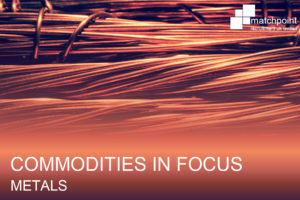
The first in our new series of COMMODITIES IN FOCUS blogs looks at Metals.
You may remember our October blog last year which looked at London Metals Exchange Week and the importance of this annual event in the global commodities calendar. In that blog we highlighted the ongoing global trend for metal consumption and for metal recycling, and at Matchpoint Recruitment we continue to see a high demand for commodities professionals who specialise in metals.
This month’s blog taking a further look at the metals sector and the trends for this vital global commodity.

Metal – a vital global commodity
Metals are used for a vast range of different personal, commercial and industrial applications – for consumer goods that we use every day, as well as in manufacturing and construction. They are vitally important for the global automobile and wider transport industry, as well as electronics and energy production. Since the iron age the human race has evolved to be highly dependent on these materials in all aspects of life.
Metals are classed as commodities because they come from the earth and also because in their raw form they are broadly the same from supplier to supplier. This is why they form such an important part of our global financial and trade infrastructure.

Metal is vital for global infrastructure
Broadly speaking, metals commodities can be divided into two main groups.
PRECIOUS metals – silver, gold, platinum and palladium. These metals are used in manufacturing (e.g. gold is widely used in electronics because it is highly conductive) but due to their rarity and attractiveness they are most commonly used in jewellery or as an investment in their own right.
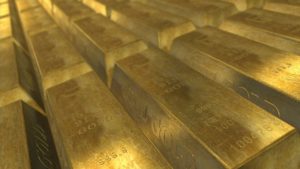
Gold remains a popular asset for investors
BASE metals are used for a range of different applications in industry and manufacturing:
Aluminium is light in weight but also durable and strong. It has many applications around the home and in industry and manufacturing – just think about how many aluminium cans most of us buy in our weekly grocery shops. Aluminium is also particularly easy to recycle which adds to its versatility.
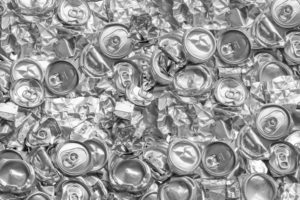
Aluminium is highly recyclable
Copper is widely used in wiring, piping and electronics and can also be combined with other metals to create alloys such as brass. Copper is also antimicrobial – which makes it an important material for a range of healthcare settings and requirements.

Copper wiring
Iron ore is most commonly used for the production of steel – see below.
Lead is used in construction and also for some automobile parts. In the past it was a common roofing material, although it can be dangerous to human health so many manufacturers have looked for alternatives over time.
Nickel is most commonly used as an alloy in combination with copper or iron, and is then manufactured into many different household items from coins to cutlery. It is strong and non corrosive and also widely recycled.
Steel is an alloy which is mainly made up of iron. Many of us are familiar with stainless steel which is used for lots of human purposes including surgical and medical equipment. Steel is also widely utilised in the construction and transport industries.

Highly versatile steel
Tin bonds well with other metals so is used as a metal coating as well as in alloys.
Zinc is a metal which helps to prevent corrosion so is often used as a coating. It is also combined with other metals to create alloys, including brass.
Due to their ubiquitous nature, metals are widely traded worldwide.
The London Metals Exchange Is the most important global exchange for industrial metal trading. Although this is a truly international sector as metals are mined, manufactured and traded around the globe, this London based exchange remains at the heart of the industry and that is why we continue to see such a high demand for metals brokers and other professionals here in the capital.
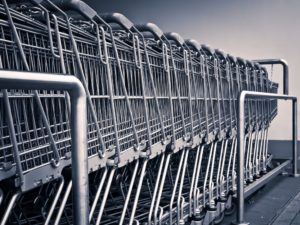
The LME is the most important exchange for metal trading
In last year’s LME blog we looked at some of the macro factors which have a global impact on the world’s never ending requirement for more metal, including the continuing demand for recycled metals, China’s ongoing need for metals to build increased infrastructure, and the general global growth and urbanisation of the world’s population.
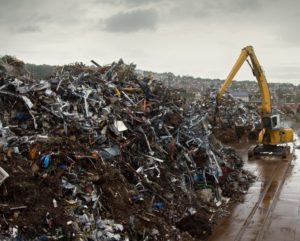
All types of metal – including recycled metal – remain in great demand
As with all commodities – there are also shorter term influences on the global sector. A recent report by the global financial services company, ING looked at the trends for commodities as a whole in 2019, and picked out some of the factors that would likely affect the metals markets this year.
Copper prices, for example, are directly affected by the trade deliberations between the US and China. At the end of last year there were hopes that relations might improve during 2019, but in reality the situation is now actually worse. Although ING does indicate that the outlook across all base metals is generally positive for 2019.
If you look back to our ‘Key trends for 2019’ blog, we indicated the potential for financial uncertainty this year, following the more bullish mood of the last few years following the crash of 2008. The price of Gold has the capacity to be positively affected when there are general fears about the growth and health of the global economy as this is a tangible asset where investors can take shelter in difficult times. ING indicates in their report that volatility in equity markets and general global uncertainty both have an ‘upside’ for gold prices.
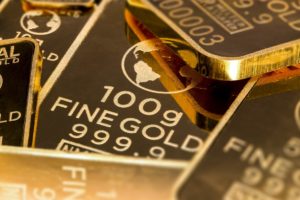
An upside for gold prices in 2019?
In another report by Forbes published at the end of last year, palladium was highlighted as the best performing of all commodities last year. Forbes echoed the view from ING that the growing demand for ‘defensive assets’ would be positive for gold and other precious metals in 2019.
In line with the world’s insatiable appetite for metal, we continue to see a demand from our clients for experienced metals commodities professionals. As experts in supporting our clients to fill their roles with the best professionals, Matchpoint Recruitment are ideally placed to help with your commodity staffing requirements. Get in touch or register with us today.